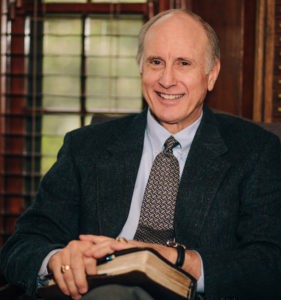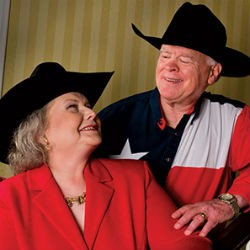Search the internet or the indices of books written about the history of the Southern Baptist Convention and you’ll find few references to August “Augie” Boto.
This week, Boto’s name is all over the internet, however, because of his starring role in the alleged cover up of known sexual abuse in SBC churches. But prior to that, Boto had been one of the most powerful men in the SBC who few people knew existed.
A lifelong Southern Baptist, he had historic ties to two of the most prominent conservative SBC churches in Texas long before becoming executive vice president and general counsel at the SBC Executive Committee in Nashville, Tenn.
Baptist heritage
Boto came to faith at age 7 and was baptized at Magnolia Baptist Church in Riverside, Calif., where his grandfather had been the pastor. Later, his family moved to Dallas, where they became longtime members of First Baptist Church, under the pastorate of W.A. Criswell.

August Boto
Boto left Dallas for Waco, where he earned two degrees from Baylor University: A bachelor of business administration degree and a law degree.
As a young lawyer, Boto was present in 1980 at First Baptist, Dallas, for one of the early meetings of fundamentalists plotting to take control of the SBC by electing a string of presidents beginning in 1979. At that time, Paige Patterson was president of Criswell College and an associate pastor at First Baptist, Dallas. Patterson and Paul Pressler were the co-architects of the so-called “conservative resurgence.”
A report in the Baptist Standard identifies Boto as one of those enlisted to help get out the vote in North Texas for the conservative SBC movement.
Legal career
While aiding the conservative cause through his church, Boto went on to become a partner in a Dallas law firm, an independent trader on the Chicago Board of Trade and also a county attorney. For six years, he was Cooke County Attorney in Gainesville, Texas, which is located near the Texas-Oklahoma border.
In 1985, Boto moved to Austin, where he became administrative counsel for the Texas District and County Attorneys Association. In Austin, he became active at Hyde Park Baptist Church, where Ralph Smith was pastor. Hyde Park was one of the largest conservative churches in the SBC, although not as well-known outside Texas as First Baptist, Dallas.
It was there, however, that Boto overlapped with Harold Riley, a wealthy businessman who later created a private foundation to benefit Southwestern Baptist Theological Seminary and Baylor University. That connection would become pivotal to Boto’s life story 30 years later.
At the Executive Committee
In 1995, Boto was elected a trustee of the SBC Executive Committee.
Three years later, while still serving as a trustee, Boto was elected vice president of convention policy and staff counsel. He filled an opening created by the retirement of Ernest Mosley, longtime No. 2 at the Executive Committee. A story at the time said: “Among Boto’s responsibilities will be managing the process of review and change in the policy documents of the SBC, its Executive Committee, boards, commission and seminaries, including the SBC constitution, bylaws, business and financial plan and SBC entity constitutions, bylaws and charters.”
Boto came on board working with then-Executive Committee President Morris Chapman, who said of him at the time: “As an attorney, Boto will bring a wealth of knowledge to the position of vice president for convention policy/staff counsel. His expertise in legal matters and keen awareness of convention polity will be enormously helpful to the Executive Committee and the Southern Baptist Convention.”
In time, Boto’s role was expanded to executive vice president and general counsel, and for a 13-month period in 2018 and 2019, he served as interim president of the Executive Committee after Chapman’s successor abruptly left.
Boto announced his retirement three months after Ronnie Floyd was elected Executive Committee president in April 2019 and left the role Sept. 30, 2019.
Patterson’s problems
Just a year earlier, Paige Patterson had been fired as president of Southwestern Seminary in Fort Worth, Texas. He was terminated, in part, for mishandling known cases of sexual abuse and for famously saying of an abuse survivor that he wanted to “break her down.”

Dorothy and Paige Patterson
Patterson’s bitter departure from Southwestern — he and his wife had planned to live in a seminary-owned residence with special privileges for life — set off a curious sequence of events in which Boto also played a starring role.
Boto, Patterson and others allegedly attempted to take control of the Harold Riley Foundation — which now had $15 million in assets — and redirect its charitable giving away from Southwestern Seminary and Baylor University to the Sandy Creek Foundation, a private foundation benefiting the work of the Pattersons and providing them a large estate in rural north Texas.
Boto’s work on this scheme happened while he still was employed by the SBC Executive Committee, in fact, while he was serving as interim president.
Ultimately, Boto and others ended up in court over this — and over a related attempt to gain lucrative seats on the board of the $300 million publicly traded company Citizens Inc., from which the Riley Foundation received its income. Just days short of Patterson being forced to testify in court, a settlement was reached.
Court documents described Boto and another defendant, Charles Hott, as “longtime, close allies of Patterson in Baptist circles.”
An attorney for the current administration at Southwestern said in now-public correspondence that Boto “worked directly with Dr. Paige Patterson in 2017 to carry out a plan with the (SBC) Committee on Nominations to get Charles Hott on the Southwestern Seminary board of trustees” and that “within a month of his election to the seminary’s board, Dorothy Patterson recommended Mr. Hott to serve as a trustee for the Harold E. Riley Foundation.”
Terms of a settlement that prevented Patterson from being compelled to testify in court stated that Hott, Boto and another man must resign from the Riley Foundation board and be barred from employment and board service to any Texas charitable organization or Southern Baptist Convention entity. This settlement was reached in February 2021.
Thus, the former No. 2 leader at the SBC Executive Committee — the man who now has been identified as blocking most calls for reform in the SBC about sexual abuse and who worked to silence abuse survivors — by court order may never again serve as an employee or board member of any SBC entity.
Related articles:
Guidepost report documents pattern of ignoring, denying and deflecting on sexual abuse claims in SBC
SBC report shows how five words turn abuse victim from ‘survivor’ to ‘whore’ | Opinion by Marv Knox


